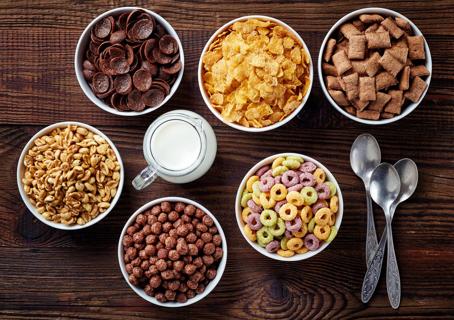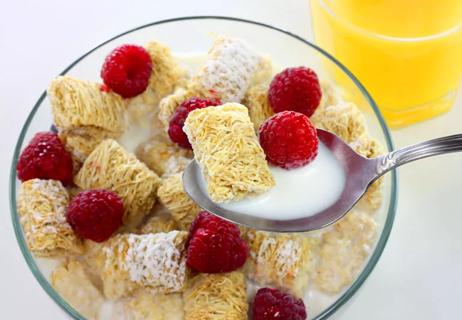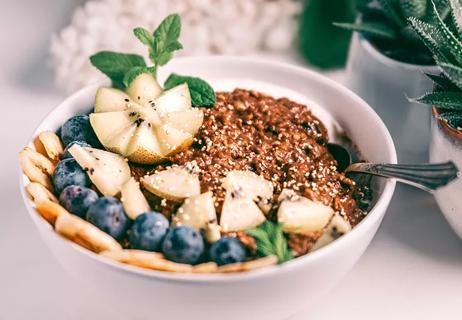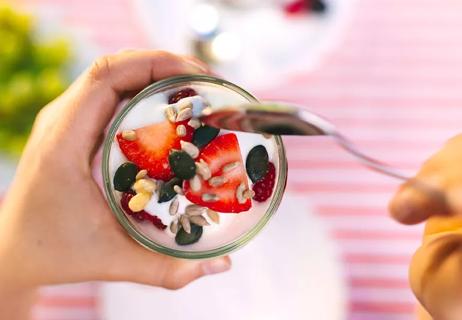Learn the benefits of a morning meal, plus five healthy food ideas to start your day right

“Breakfast is the most important meal of the day!” We’ve all heard the saying, right? Well, if you’re not a wake-up-hungry sort of person, it’s probably an idea that’s tough to swallow.
Advertisement
Cleveland Clinic is a non-profit academic medical center. Advertising on our site helps support our mission. We do not endorse non-Cleveland Clinic products or services. Policy
But here’s the question: Are you really harming your health if you skip breakfast?
We asked registered dietitian Beth Czerwony, RD, LD, if breakfast really is “the most important meal of the day.” (Spoiler alert: She’s a big fan of starting days with some nutritional intake to perform your best.)
Based on observational studies, these are the selling points for eating breakfast within a few hours of waking:
Eating breakfast provides energy to power into your day and help your body perform at its best.
“Would you start a long road trip in your car with the tank on empty?” asks Czerwony. “Think of eating breakfast the same way. You’re asking a lot of your body to get moving using only your reserves.”
The morning is when your body is most insulin-sensitive — when it uses blood sugar more effectively. So, it’s a great time to choose fiber-filled carbs that’ll help you get 25 grams or more of dietary fiber a day to help lower your cholesterol.
And if you’re looking for heart-healthy breakfast options, here are five to consider.
One observational study found that people who skipped breakfast four to five days a week had as much as a 55% increased risk for Type 2 diabetes.
But be mindful of what ends up on your breakfast plate or breakfast bowl. Sugary cereals or traditional breakfast fare, such as donuts, muffins, waffles, pancakes and bagels, can be high in sugar, starch or fat.
Advertisement
Your brain needs fuel to function. Breakfast can help you be more alert, focused and happy. (Just don’t overdo it on the coffee, which can lead to a crash later in the day.)
It’s particularly important for children to feed their minds at breakfast. Studies show kids who eat in the morning are better able to pay attention at school, resulting in improved academic performance. “It’s a lot easier to concentrate if your belly’s not grumbling,” notes Czerwony.
Much of the advice relating to the importance of breakfast is based on observational studies, says Czerwony. These studies aren’t randomized clinical trials that prove their importance. (That’s welcome news if your stomach churns at the thought of eating breakfast in the morning.)
So, if you’re someone who doesn’t wake up hungry, delaying the first meal may be better. Others skip breakfast as part of an intermittent fasting style of eating.
“An early breakfast may not be for everyone,” says Czerwony. “Listen to your hunger cues to know how important it is for you. What you eat over the whole day is more important than stressing over breakfast.”
This doesn’t mean that the “eat breakfast” advice is bunk. It just means the importance varies from person to person.
The term “breakfast” means breaking the fast. And at some point in our day, all of us do that, whether it’s at 7 a.m. or noon. Ideally, the recommendation is to put some food in your belly within two hours of getting up for the day.
Finding that time to eat, however, seems to be an issue for some. Many of the 25% of Americans who skip breakfast say they just can’t fit the meal into their morning schedule.
If your mornings are hectic, plan ahead so you can grab-and-go, suggests Czerwony.
“Think about breakfast barriers the night before,” she says. “Do you need to have the toaster and items ready on the countertop? Can crockpot oatmeal save your morning? A little planning goes a long way to getting you out the door and to work on time.”
An added bonus? Staring your day with a protein-rich meal may keep you full longer and help you avoid snacking — which could help keep away unwanted pounds. (Learn how to build a healthy breakfast for weight loss.)
To keep your eyes from going half-mast by 10 a.m., choose whole foods and skip processed foods that have extra sugar. Eating a variety of nutritious foods can help you feel fuller longer and carry you through to lunch.
Czerwony suggests these fuel-and-go favorites to start your day.
Advertisement
This protein-and-fat combo can give you a feeling of fullness that lasts a little longer. You can mix in fruits, nuts or whole-grain cereal. “Some people even enjoy spreading cottage cheese on toast,” says Czerwony.
If you’re feeling really adventurous, maybe try making cottage cheese pancakes for a protein-rich start to your day.
The healthy fat and protein in peanut butter pair well with a slice of high-fiber toast, a freezer waffle or an English muffin. If you’re feeling nostalgic for a PB&J, try this fruit-forward adult version of the childhood classic.
If you have a peanut allergy, avocado is another tasty topping for toast. (Learn more about the health benefits of avocados.)
Combine it with berries and walnuts or flaxseed. “Oats only take 3 minutes in a microwave, so it doesn’t have to be time-consuming,” says Czerwony.
If you’re a plan-ahead sort of person, give overnight oats a try. This premade breakfast features oats soaked overnight in water, milk or yogurt. Here are seven flavorful combinations to get your day started right.
Want to get last night’s vegetable leftovers out of the fridge? An omelet is the way to go.
Make an egg- or tofu-veggie scramble using those farmer’s market goods. (Here’s a delish and healthy recipe for a garden omelet featuring Brussels sprouts, kale leaves, spinach and avocados.
Advertisement
Want another option? Place the egg or tofu scramble in a whole grain wrap and add black beans, salsa and a sprinkle of cheese. You can make these breakfast burritos ahead of time and microwave them or eat them chilled.
If eating breakfast still isn’t your thing, there’s no law against drinking it. So, maybe try the “Ultra Shake” for an ultra-nutritious morning meal.
“For kids or adults who aren’t hungry, a beverage might be a better option,” says Czerwony. “A cup of milk with a piece of fruit on the side or a low-sugar meal replacement shake may do the trick.”
Advertisement

Sign up for our Health Essentials emails for expert guidance on nutrition, fitness, sleep, skin care and more.
Learn more about our editorial process.
Advertisement

There are better breakfast options, but if it’s got to be cereal, look for whole grains, high fiber and no added sugar

Whole-grain options low in sugar and sodium form the foundation of a good-for-you breakfast

Move over oatmeal! It’s time to make room at the table for these grain options

Who doesn’t love a good breakfast? Just make sure it’s loving you back

Cravings are a natural response to hormonal changes, but giving into them may make you feel worse

Alternating between periods of eating and fasting may benefit your health

Eating a healthy diet, reducing stress, and focusing on exercise and sleep can help keep your digestive system in top form

Even small moments of time outdoors can help reduce stress, boost mood and restore a sense of calm

A correct prescription helps your eyes see clearly — but as natural changes occur, you may need stronger or different eyeglasses

Both are medical emergencies, but they are very distinct events with different causes